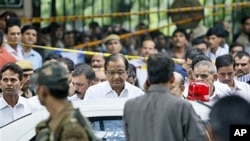India's top leaders spent a full day listening to concerns by officials from areas hit hard by left-wing insurgency movements. The federal government is promising increased overall security and greater fairness in managing resources.
Indian Home Minister P. Chidambaram said Tuesday that left-wing extremism is the “most violent movement” in the country. He was speaking to officials from more than 60 districts affected by violent attacks by Naxal, or Maoist, insurgent groups.
India's prime minister has referred to Naxalism as the greatest security threat facing India. The groups include some of the country's most extreme poor, who say they are struggling against state-sanctioned acquisition of their land and natural resources.
Cracking down on Naxals
The rebels are widely seen as terrorists. Thousands of civilian and police deaths in India are blamed on Naxal attacks since the groups emerged in the late 1960s.
Home Minister Chidambaram said the central government plans to increase security personnel to combat the violence, while also repairing infrastructure targeted by Naxal attacks.
"We are now raising specialized battalions, which will have a security and engineering component," said Chidambaram. "But it will take time to raise these battalions. These battalions cannot be conjured by rubbing Aladdin's lamp."
Fair revenue sharing
Jairam Ramesh, minister of rural development, said the government is examining policy options to give populations in rebel-affected areas a better chance at earning a livelihood.
"How to bring about a greater degree of convergence between the objectives of the Forest Conservation Act, the Forest Rights Act, and the aspirations of the people," said Ramesh. "As far as minerals are concerned, the government is contemplating amendments to the Minerals Act to allow for greater revenue sharing with tribal communities."
India's parliament also is in the process of debating a new land acquisition law to replace a century-old measure put in place by the British. The measure aims to give rural and tribal Indians fairer compensation when the state takes over land for development projects.




